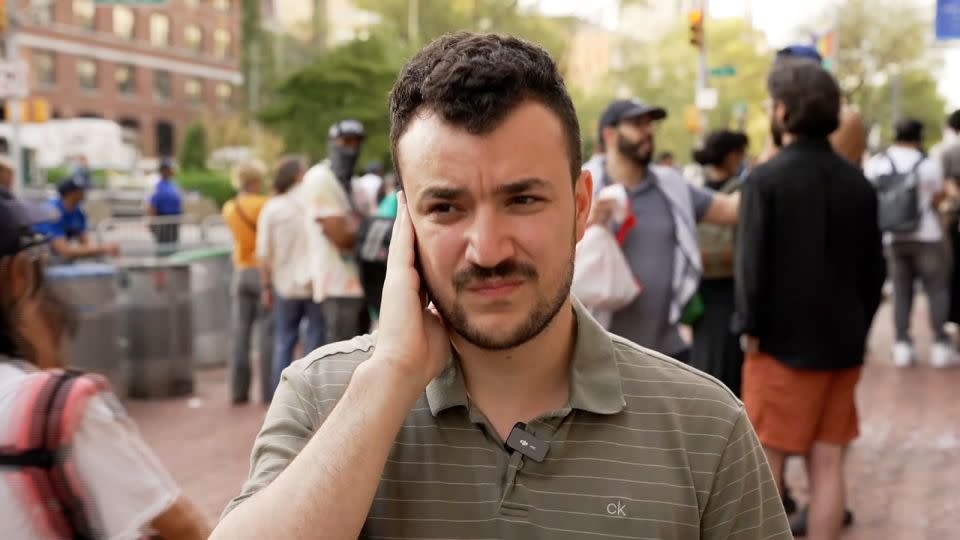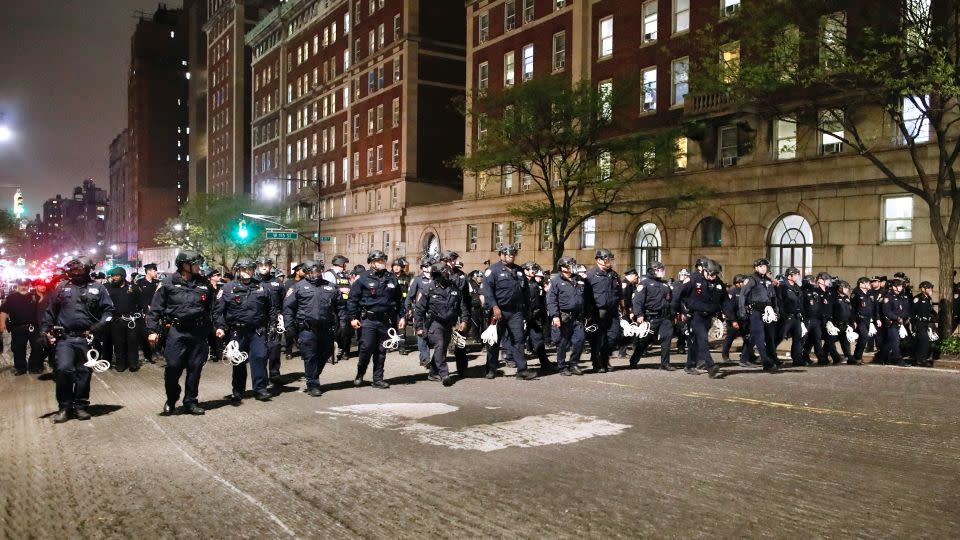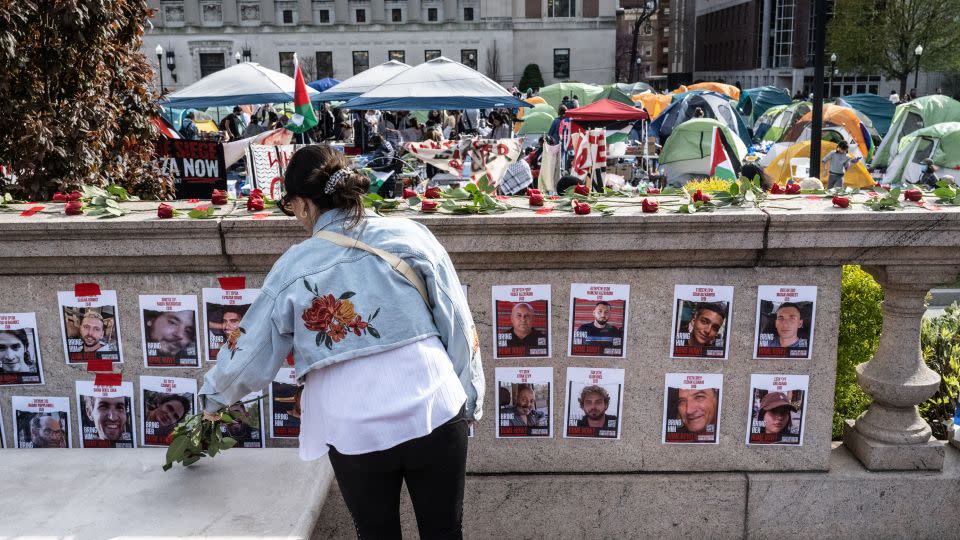Inside the tense talks between Columbia protesters and administrators before NYPD moved in
As one of the lead negotiators for students protesting inside the grounds of Columbia University, Mahmoud Khalil said his primary objective was to get the university to sever all financial ties with Israel.
But as he offered up draft agreements and counter proposals, spoke with mediators in the encampment and sat across the table from high-ranking school administrators, he said he quickly realized that school leaders “were willing to negotiate on anything but divestment.”
“The university made it very clear they didn’t want to criticize Israel or … want their actions to be interpreted as criticism of Israel,” Khalil said in an interview with CNN.
Khalil, a 29-year-old Palestinian student seeking a master’s degree in public affairs, shared copies of proposals he said he and another student negotiator presented to the administration. Khalil said Columbia never put anything in writing, instead making offers verbally. Still, the documents the students delivered to the administration shed new light on their discussions surrounding issues of divestiture, student amnesty, international aid, and concessions the university was willing to make.
“The university refused to commit to divestment, and we wanted assurances,” Khalil said.
The records and interviews show that Khalil and fellow protesters were unwilling to accept terms offered by Columbia that were similar to proposals that students at other campuses, such as Brown University, had accepted. Columbia, like Brown, offered to review its investments and consider divestitures. But without a firm promise, Columbia’s offer didn’t go far enough for Khalil and other protesters, since the university had previously rejected divestment proposals.

Just days after the encampment first appeared, Khalil said he and other protest leaders were offered a meeting with school president Minouche Shafik to discuss their demands. They declined, he said, believing it to be a publicity stunt by the school where the substance of their concerns and demands would not be addressed. Instead, they continued negotiating with other administrators from the school.
Part of the protesters’ demands called for more transparency of Columbia’s investment portfolio to be able to fully assess the university’s ties to Israel and the war in Gaza.
Less than 1% of the school’s $13.6 billion endowment is publicly disclosed. From that limited information, protestors identified small holdings in 19 companies they believe are connected to the conflict between Israel and Hamas, including defense contractors Lockheed Martin and General Dynamics that make weapons used by Israel, and Caterpillar, whose bulldozers have been used by Israel to demolish Palestinian infrastructure in the West Bank and have been used by the IDF during the ground invasion of Gaza. Based on the students’ findings of Columbia’s public investments, they asked for more transparency of the university’s undisclosed financial holdings.
The school did not offer to completely open its books to the students but, according to a statement from Shafik, instead offered a process for students to access the school’s direct holdings and to more frequently update that list. The university also proposed launching programs to aid childhood development in the West Bank and Gaza, among other suggestions.
Khalil said they then presented Columbia with another offer: Rather than dump Israel-tied investments, Columbia could instead divest from weapons manufacturing companies and any companies complicit in violating international law.

Columbia again declined their offer, Khalil said, instead threatening suspensions for those at the encampment. At that point, Khalil and his co-negotiator got up and walked out.
“It was clear they didn’t want to do anything,” he said.
Shortly thereafter, in a statement on May 1, Shafik announced that the negotiations were over. She said that university leaders had engaged with protesters “in serious dialogue in good faith” and offered various overtures including the consideration of new divestment proposals but were “unable to come to resolution.” She had earlier stated that the university sought to collaboratively reach an agreement with protesters that would result in the orderly removal of the encampment, which she said had created an unwelcoming environment for many Jewish students and faculty.
A spokesperson for Columbia declined to comment on the details of the negotiations but referred CNN to public comments from Shafik.
The New York Police Department cleared the student encampment, which involved a variety of participants including Jewish students, after nearly two weeks. The school suspended Khalil, a move they later reversed. A university official who was unwilling to speak on record described Khalil’s suspension as “unintentional.”
Meanwhile, student protesters at some other universities were able to reach agreements with their administrations to reconsider divestiture.
Just a few hours north, at Brown University, the administration agreed to consider divestment from companies that support Israel after what the school’s president called “productive discussions” with students, who in turn agreed to end their encampment. A school advisory committee will provide a recommendation on whether to divest in the fall, and then a university board will vote on the matter, according to the agreement.
Northwestern University also reached a deal with protestors in which the school committed to answering questions about specific financial holdings and reestablishing an advisory committee for responsible investment.
Other universities have rejected protesters’ calls to divest from Israel and some have outright refused to negotiate. Speaking on CNN’s “State of the Union” Sunday, University of Florida President Ben Sasse said, “We just don’t negotiate with people who scream the loudest … A lot of universities bizarrely give the most attention and most voice to the smallest, angriest group, and it’s just not what we’re going to do here.”
Given Columbia’s history, Khalil and his fellow students had some reason to be hopeful that the school would be responsive to their demands. The university has a storied history of student protests and demands for divestments on other hot-button issues.
Students in the 1980s called on the university to withdraw investments in companies doing business in South Africa, which then maintained a racial segregation policy called apartheid. Columbia’s student senate approved a plan to divest in 1983 but the university’s trustees initially opposed their efforts. The trustees eventually conceded and voted to sell most of the university’s stock in US companies with business in the country.
More recently, Columbia emerged as a leader when in 2015 it became the first college in the United States to divest from private prison companies after a student activist campaign that launched the year before.
Columbia now also refrains from investing in publicly traded tobacco, thermal coal and fossil fuel companies.
But when it comes to Israel, the university has long taken a different stance.
In 2002, Columbia’s then-president Lee Bollinger criticized a petition to divest from companies that had sold arms to Israel. At the time, Bollinger said, “The petition alleges human rights abuses and compares Israel to South Africa at the time of apartheid, an analogy I believe is both grotesque and offensive,” according to the Columbia Daily Spectator student newspaper. An advisory committee sided with Bollinger in opposition to the petition, the paper reported.

Comparisons between Israel and the apartheid system in South Africa that ended in the 1990s have sparked contentious debate. The advocacy group Human Rights Watch has accused Israel of seeking the “domination of Jewish Israelis over Palestinians” coupled with “systematic oppression” and “inhumane acts,” which the group argued amounts to apartheid. Israel’s Ministry of Foreign Affairs called those claims “preposterous and false.” The Anti-Defamation League stated that Israel has safeguards for ensuring equal treatment of citizens and argued that the apartheid label “would seem to question the legitimacy of the world’s only Jewish state.”
In 2016, a coalition of Columbia students again launched a campaign to push the university to cut ties with certain Israel-linked companies.
That effort eventually led to an undergraduate student vote that favored divesting, but then-president Bollinger again opposed the effort and said in a 2020 statement that such matters aren’t decided by student referendum and that the university “should not change its investment policies on the basis of particular views about a complex policy issue, especially when there is no consensus across the University community about that issue.”
The student newspaper reported last month that another vote at Columbia College – an undergraduate school at the university – overwhelmingly favored divestment from Israel, though less than half of the college’s students participated.
The university committee that advises on the ethics of the school’s investments also ruled against a proposal to divest from Israel in February. The committee concluded that “there is significant opposition in the Columbia University community to withdrawing financial support from Israel, as evidenced by the actions of many students, faculty, and alumni.”
In recent months, Columbia has faced pressure from donors on matters related to Israel and protesters.
Hedge fund billionaire Leon Cooperman threatened in October to halt donations to the university and called for the school to terminate or suspend a professor who had written favorably of Hamas’ October 7 attack. Cooperman criticized protesters and said, “Israel is the only reliable ally the United States has in the Middle East.” In April, donor Robert Kraft, owner of the New England Patriots, called for the school to end the protests and suggested he would withhold donations because he was “no longer confident that Columbia can protect its students and staff.”
Even if Columbia wanted to divest all its assets with varying links to Israel, the nature of endowments makes that quite difficult, experts told CNN.
For example, the university could easily sell shares of individual stocks it directly holds, but investments in index funds would require someone to painstakingly analyze each company in the fund to understand whether ties to Israel exist. And Columbia may lack authority to dictate terms on private equity investments managed by separate partners.
“It’s much more difficult to put restrictions on the indirect investments,” said Luigi Zingales, a professor at the University of Chicago’s Booth School of Business. Zingales argued pro-Palestinian protesters would probably have more success in achieving their goals if they focused on only a few specific companies in which universities have direct investments, rather than calls for broader divestment.
On Thursday, Columbia’s president published an editorial in the Financial Times affirming the university’s commitment to free speech. “We were unable to come to an agreement but this can not be the end of the dialogue,” Shafik wrote. “This crisis has also revealed how vulnerable universities are to those that seek to divide us,” she added.
As for Khalil, the student negotiator at Columbia, he told CNN that in hindsight he thinks his group may have been too lenient in their negotiation tactics.
“We were negotiating in very good faith. I would have changed my approach regarding that,” he said. “I don’t regret not reaching an agreement because the agreement they offered was, to us, literally rubbish. It did not have anything, so I’m glad that we did not accept.”
With negotiations over, Khalil said he’s focused on strengthening Columbia’s Palestinian community and educating a growing number of students interested in, and supportive of, the Palestinian cause.
“There’s definitely a momentum right now,” he said.
For more CNN news and newsletters create an account at CNN.com
